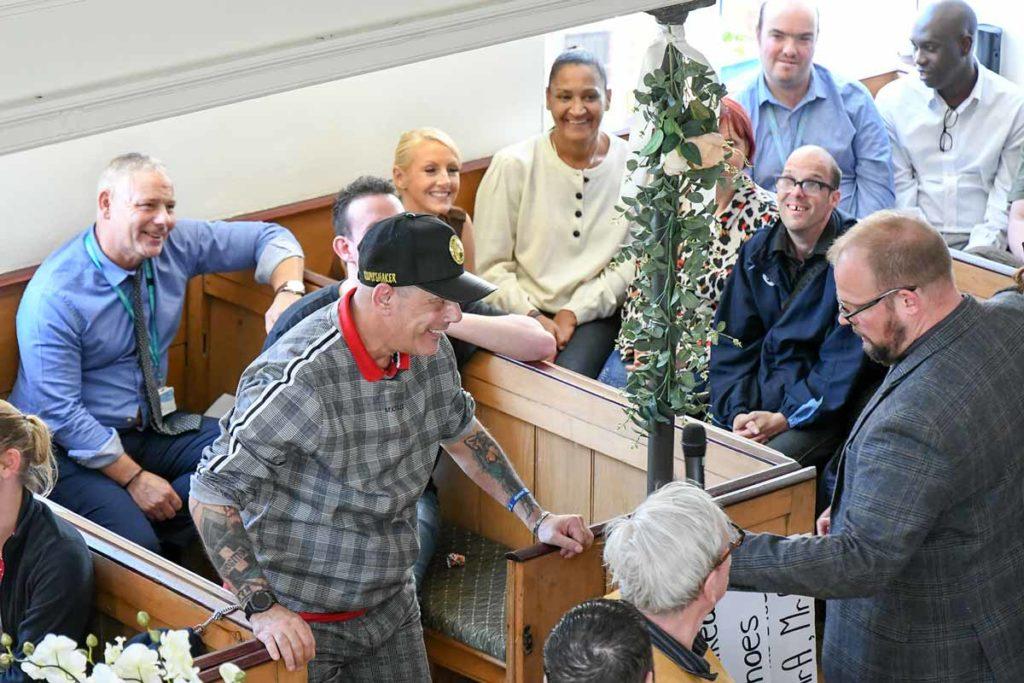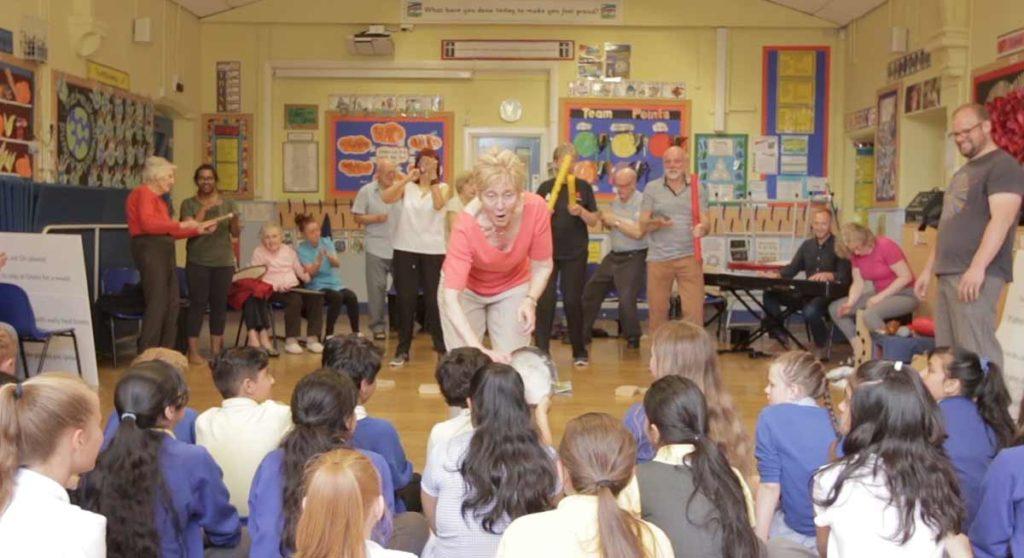
A vision for The Arts Councils ‘Let’s Create’ strategy and the role theatre can play in (re)building communities during these unprecedented times, Made By Mortals style. This blog explores how the principles of coproduction have influenced our work and given us a theory of change/growth to hang our theatrical hats on.
As a Director of Made By Mortals, I was overjoyed when I first encountered The Arts Councils new strategy. It felt like finally the day of the artist dedicated to participatory arts had come. That, smaller grass roots organisations like ours, can finally get the support and recognition they need to reach more people and create great art. I read earlier this year that two of the leading opera companies received about £100 of public money for each ticket they sold in 2017-18. Don’t get me wrong, if someone brought me a ticket to see some of that opera, I bet I’d be blown away. I suspect many of the participants I work with would be as well (although by no means all of them). We would have sat on our chairs and consumed everything the opera company threw at us and enjoyed every mouthful. But that would only slightly be helping us ‘develop’ our creativity- in the way a trip to your local outdoor market could, and it wouldn’t have helped us ‘express’ our creativity at all. Our levels of participation would be low during this operatic exchange. Outside the theatre world, business has been declaring for a few years now that people are trading consumption for experience – that CONsumers have become PROsumers (to be honest I don’t quite know what this last word means but it sounds like a clear shift in the direction of my argument, so I like it). In addition to this, within many public sector organisations there is a growing culture and practice of public engagement in the design and delivery of services. Arts and culture cannot live in a vacuum from these shifts. Presuming/hoping/praying our sector survives, I believe we need to use this opportunity to evolve to meet the expectations and needs of the public at large. And it is clear that participation is where it’s at. So, the new strategy from ACE feels like an important sea change in the right direction, particularly within the context of Covid-19. It is now more important than ever that everyone plays their part in (re)building communities and harnessing the additional community spirt that has been evoked by the disease. And what better way to play that part than by developing and expressing your creativity through music and theatre.
‘Everyone can develop and express creativity throughout their life’.
Arts Council England (ACE) 10 year strategy 2020.
With this in mind, I guess the question the above statement from ACE provokes is how- how can we (the royal we) ensure this is possible for as many people as possible- in fact, well, ‘everyone’? How will this be achieved in say Brieghtmet, an under-served estate in Bolton, as well as say Hebden Bridge? In my mind the reciprocal nature of coproduction is the key to this, particularly within the type of post-industrial towns Made By Mortals work. Coproduction is an approach that treats people as assets and integral stakeholders in the growth and success of the communities they live. It’s about investing in people and developing communities’ abilities to serve itself. It’s about reducing/blurring the lines between consumers and producers of services and enabling public funded organisations to become catalysts and facilitators rather than simply providers. It’s about sharing responsibility, sharing leadership, valuing/investing in contributions that are not traditional monetarised (for example family, community, care, love) and creating mutually and reciprocal incentives for participation.
I have found great power in considering the nature and how to bring about reciprocal incentives to participation within our approach. I feel this aspect, above all others, is what can ensure perpetual opportunities for people to develop and express their creativity. For example, we make people powered musical theatre exploring the health and social challenges of our times. We do this through creative collaborations between small teams of professional theatre makers, social organisations and big teams of community story-makers (participants) with a diverse range of lived experience. One of these teams are called ‘Hearts & Minds’. They are a group of around 20 older people who come together to make musical theatre for children. Some members have lived experience of long-term health conditions and/or mental health illness (including dementia). We are based in Tameside, an area in the lowest 13% of authorities for cultural engagement (Active Lives 2017). ‘Hearts & Minds’ tour (both physically and more recently virtually) the interactive work they create to local schools, many of which do not have adequate capacity to invest in high-quality cultural experiences. ‘Hearts & Minds’ are investing in the cultural opportunities of the children and educational institutions of where they live. And in return, the children (through their investment) are helping to drive health and wellbeing outcomes for the older people who take part. And everyone gets to develop and express their creativity together. This is a reciprocal relationship and one that benefits the whole community.
Through this process, I have seen some quite poorly people sparkle with life when performing a show that they have helped create, in front of a sea of smiling and appreciative young faces. I have seen teachers wipe tears from their eyes, watching the levels of engagement invested by ‘their kids’. I have witnessed Headteachers lament when they think of the money they spent on last weeks ‘professional’ pantomime. I have read pupils inspired letters of gratitude to the cast and seen the tangible impact this has had on the group. And much more besides…

We also work with ‘The Johnny Barlow Theatre Company’, a group of community story makers who come together through a passion for music and theatre and a desire to bring about social change. This group has a diverse range of lived experience and in-depth knowledge of public services to draw on. Oldham Safeguarding Board has recently used the company’s work to consult with under-served and under-represented communities, people with lived experience of addiction for example, to improve their approach to safeguarding. This has helped them rethink/redesign their services to better meet the needs of the public. Through their (modest) investment (monetary, time and expertise) in our work they have been able to better understand where to invest their limited resources to better protect the communities they serve. For example, they now invest less in trying to stem the likely downfall of an individual addict and instead invest more in their recovery. This is because of a better understanding of the addiction experience uncovered by our work. Like one man put it during an interactive element of this recent show “nothing would have stopped me until I had reached rock bottom, it’s now I need your help!”
This again is a reciprocal relationship and one that benefits the whole community. The Johnny Barlow Theatre Company are using their experience and skills to improve the public services they, and others benefit from, and those public services are helping drive the groups health and wellbeing outcomes by investing in the group. And everyone is developing and expressing their creativity together.
Creating reciprocal relationships is also how we achieve excellence within our work. We look to facilitate a process that allows large groups of people to input, test and create within an overriding vision crafted by an experienced artist. In my mind, being an artist is an egotistical act by its very nature. Federico Fellini said, ‘all art is autobiographical’. With this in mind, we look to make work that is forged from multiple egotistical autobiographical acts coming together to forge a synergy of expression that is greater than the sum of its parts, and far far greater (in terms of power and ownership) than an individual artist can create on their own. As part of this process the experienced artist charged with the job of crafting the overriding vision, will shift, shape and reshape this vision based on the co-creators’ input. They will also look for every opportunity to share power and authorship of this overriding vision wherever possible/appropriate and pass on skills to their fellow stakeholders. Through this relationship, the artist benefits from the opportunity to create great art – it is still very much their art after all. They also get opportunity to draw on a rich palette of experience and knowledge and, of course, pay their rent. The ‘community story-makers’ get to enhance their skills, create great art – it is still very much their art after all, and invest in the betterment of their communities. We use these principles to drive participation and better reach communities under-served by arts and culture.
In order for theatre to come away from being seen as a ‘nice to have’ ‘an add on if only we had the cash’ and take back its rightful place at the centre of society and the human experience, they/we have to become an integral part of a change/growth agenda. They/we have to directly feed and celebrate the stuff that really matters to people and by doing so improve the quality of life for people in communities up and down the country. Going forward the theatre sector needs to get better in creating synergies of effort working alongside a range of public services and different demographics/groups of people. The Arts Council want the creativity of each of us to be valued and given the chance to flourish, in my mind, by sitting the arts (and in particular theatre) within the principles of coproduction, this will become one of many positive results; everyone developing and expressing their creativity together.
Notes
With this ethos and approach in mind, in collaboration with us, and funded by ACE, Hearts & Minds and The Johnny Barlow Theatre Company (both in lockdown) have continued to produce work. ‘Armchair Adventures’ – a creative resource aimed at older people making original musical theatre for children and an interactive podcast. ‘Hidden’– a series of interactive audio experiences that challenge people to walk in another person’s shoes and explore their hidden lives, using the listeners own home as a theatrical backdrop.
For more information on coproduction please follow this link to a fabulous manifesto by The New Economics Foundation that has helped shape the vision for our work.
